Report on Professional Practices in Education and Training - Unit 503
VerifiedAdded on 2023/06/08
|19
|6713
|105
Report
AI Summary
This report, focusing on Unit 503 Professional Practices in Education and Training, delves into the core concepts of professionalism, including its definition and the significance of dual professionalism within the educational and training sectors. It explores how personal professional values influence practices, specifically in the context of an English teacher. The report further analyzes the impact of social, political, and economic factors on education policies, and how these policies shape curriculum and teaching methods. It also defines the roles of stakeholders, examines their accountability, and explores the importance of partnerships. Furthermore, the report assesses organizational policies, codes of practice, and their effects on curriculum. It analyzes quality improvement and assurance processes, including self-assessment, self-evaluation, and the quality cycle, while identifying areas for improvement within learning programs based on evaluation outcomes. The report provides a comprehensive overview of key aspects related to professional development within education and training.
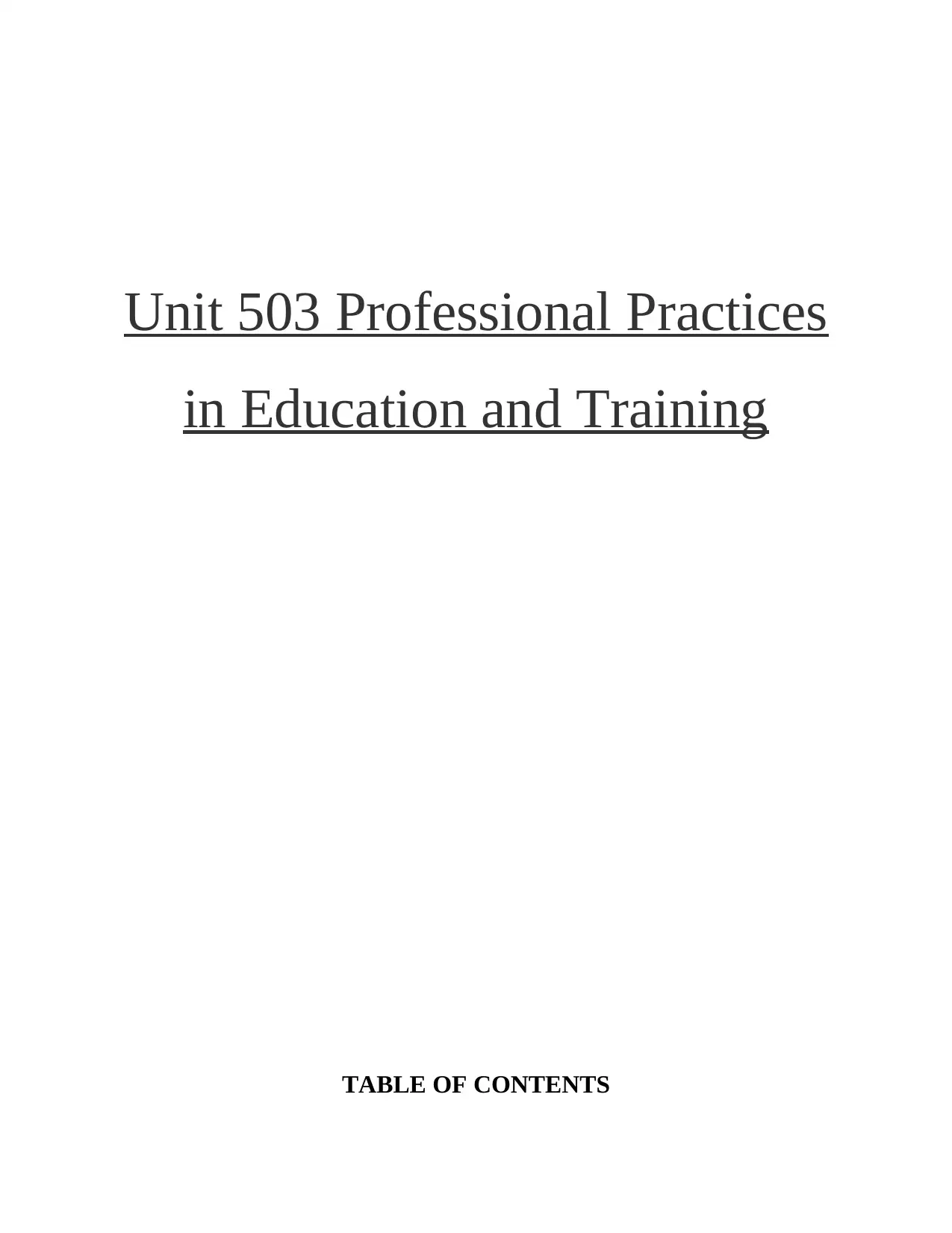
Unit 503 Professional Practices
in Education and Training
TABLE OF CONTENTS
in Education and Training
TABLE OF CONTENTS
Paraphrase This Document
Need a fresh take? Get an instant paraphrase of this document with our AI Paraphraser
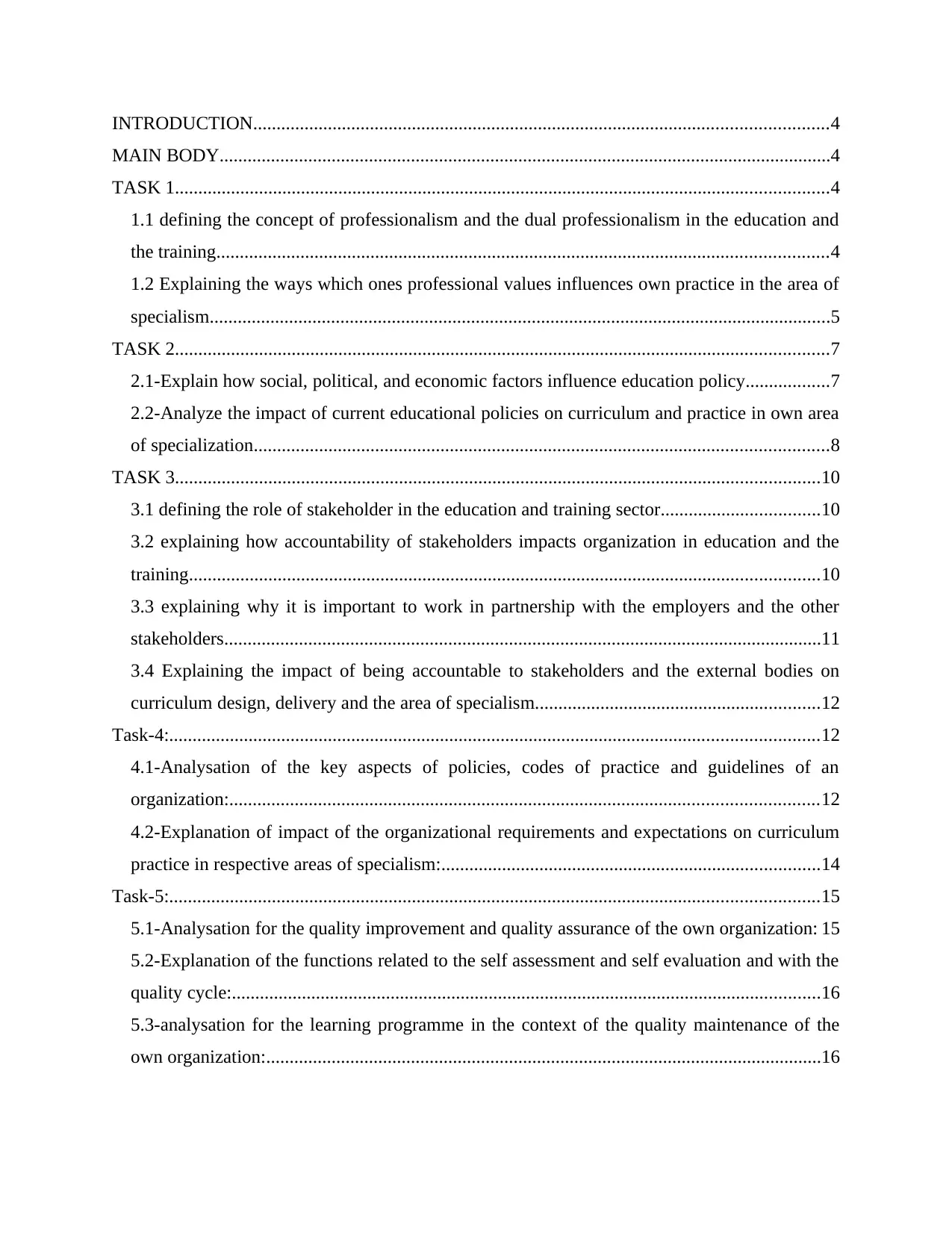
INTRODUCTION...........................................................................................................................4
MAIN BODY...................................................................................................................................4
TASK 1............................................................................................................................................4
1.1 defining the concept of professionalism and the dual professionalism in the education and
the training...................................................................................................................................4
1.2 Explaining the ways which ones professional values influences own practice in the area of
specialism.....................................................................................................................................5
TASK 2............................................................................................................................................7
2.1-Explain how social, political, and economic factors influence education policy..................7
2.2-Analyze the impact of current educational policies on curriculum and practice in own area
of specialization...........................................................................................................................8
TASK 3..........................................................................................................................................10
3.1 defining the role of stakeholder in the education and training sector..................................10
3.2 explaining how accountability of stakeholders impacts organization in education and the
training.......................................................................................................................................10
3.3 explaining why it is important to work in partnership with the employers and the other
stakeholders................................................................................................................................11
3.4 Explaining the impact of being accountable to stakeholders and the external bodies on
curriculum design, delivery and the area of specialism.............................................................12
Task-4:...........................................................................................................................................12
4.1-Analysation of the key aspects of policies, codes of practice and guidelines of an
organization:..............................................................................................................................12
4.2-Explanation of impact of the organizational requirements and expectations on curriculum
practice in respective areas of specialism:.................................................................................14
Task-5:...........................................................................................................................................15
5.1-Analysation for the quality improvement and quality assurance of the own organization: 15
5.2-Explanation of the functions related to the self assessment and self evaluation and with the
quality cycle:..............................................................................................................................16
5.3-analysation for the learning programme in the context of the quality maintenance of the
own organization:.......................................................................................................................16
MAIN BODY...................................................................................................................................4
TASK 1............................................................................................................................................4
1.1 defining the concept of professionalism and the dual professionalism in the education and
the training...................................................................................................................................4
1.2 Explaining the ways which ones professional values influences own practice in the area of
specialism.....................................................................................................................................5
TASK 2............................................................................................................................................7
2.1-Explain how social, political, and economic factors influence education policy..................7
2.2-Analyze the impact of current educational policies on curriculum and practice in own area
of specialization...........................................................................................................................8
TASK 3..........................................................................................................................................10
3.1 defining the role of stakeholder in the education and training sector..................................10
3.2 explaining how accountability of stakeholders impacts organization in education and the
training.......................................................................................................................................10
3.3 explaining why it is important to work in partnership with the employers and the other
stakeholders................................................................................................................................11
3.4 Explaining the impact of being accountable to stakeholders and the external bodies on
curriculum design, delivery and the area of specialism.............................................................12
Task-4:...........................................................................................................................................12
4.1-Analysation of the key aspects of policies, codes of practice and guidelines of an
organization:..............................................................................................................................12
4.2-Explanation of impact of the organizational requirements and expectations on curriculum
practice in respective areas of specialism:.................................................................................14
Task-5:...........................................................................................................................................15
5.1-Analysation for the quality improvement and quality assurance of the own organization: 15
5.2-Explanation of the functions related to the self assessment and self evaluation and with the
quality cycle:..............................................................................................................................16
5.3-analysation for the learning programme in the context of the quality maintenance of the
own organization:.......................................................................................................................16
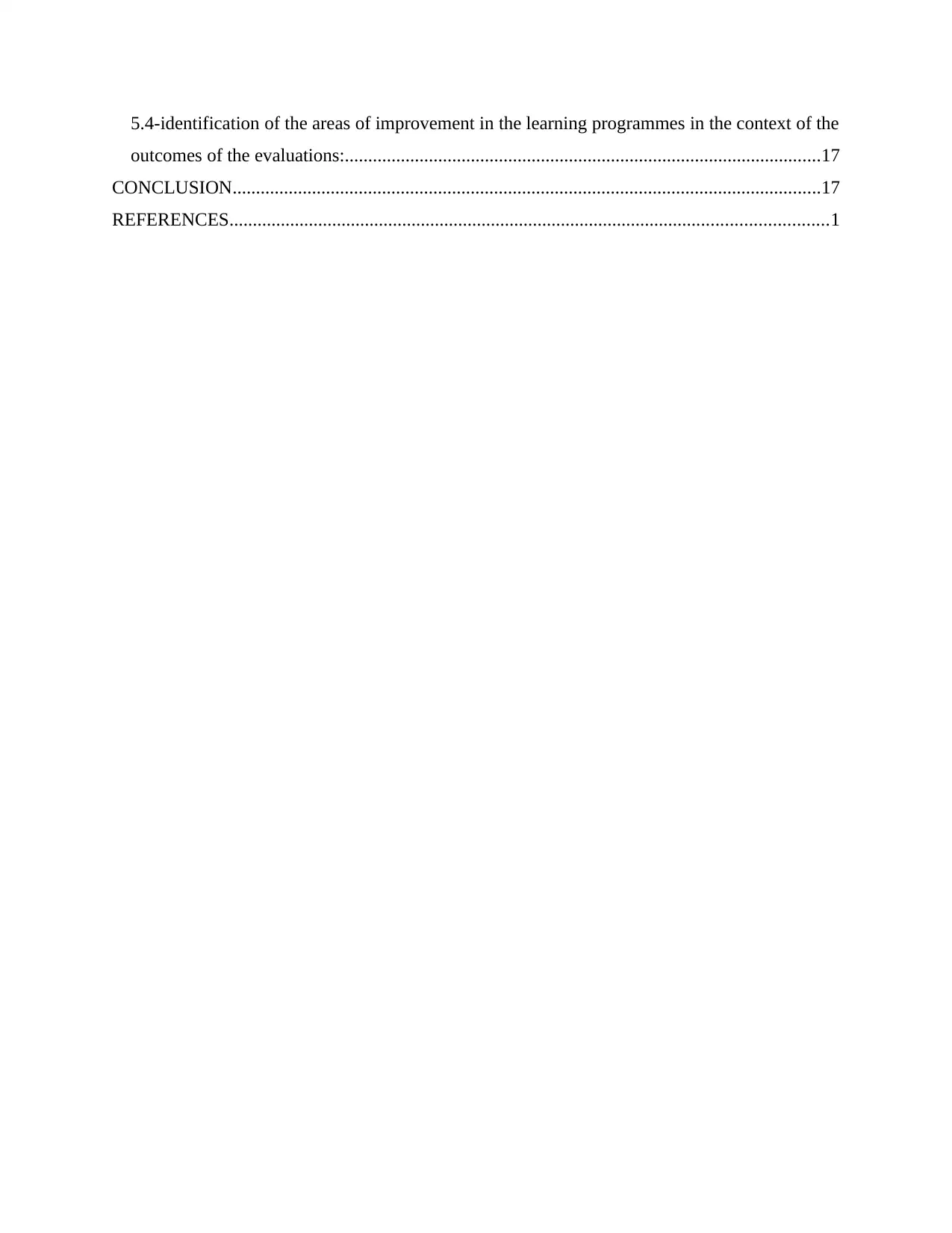
5.4-identification of the areas of improvement in the learning programmes in the context of the
outcomes of the evaluations:......................................................................................................17
CONCLUSION..............................................................................................................................17
REFERENCES................................................................................................................................1
outcomes of the evaluations:......................................................................................................17
CONCLUSION..............................................................................................................................17
REFERENCES................................................................................................................................1
⊘ This is a preview!⊘
Do you want full access?
Subscribe today to unlock all pages.

Trusted by 1+ million students worldwide
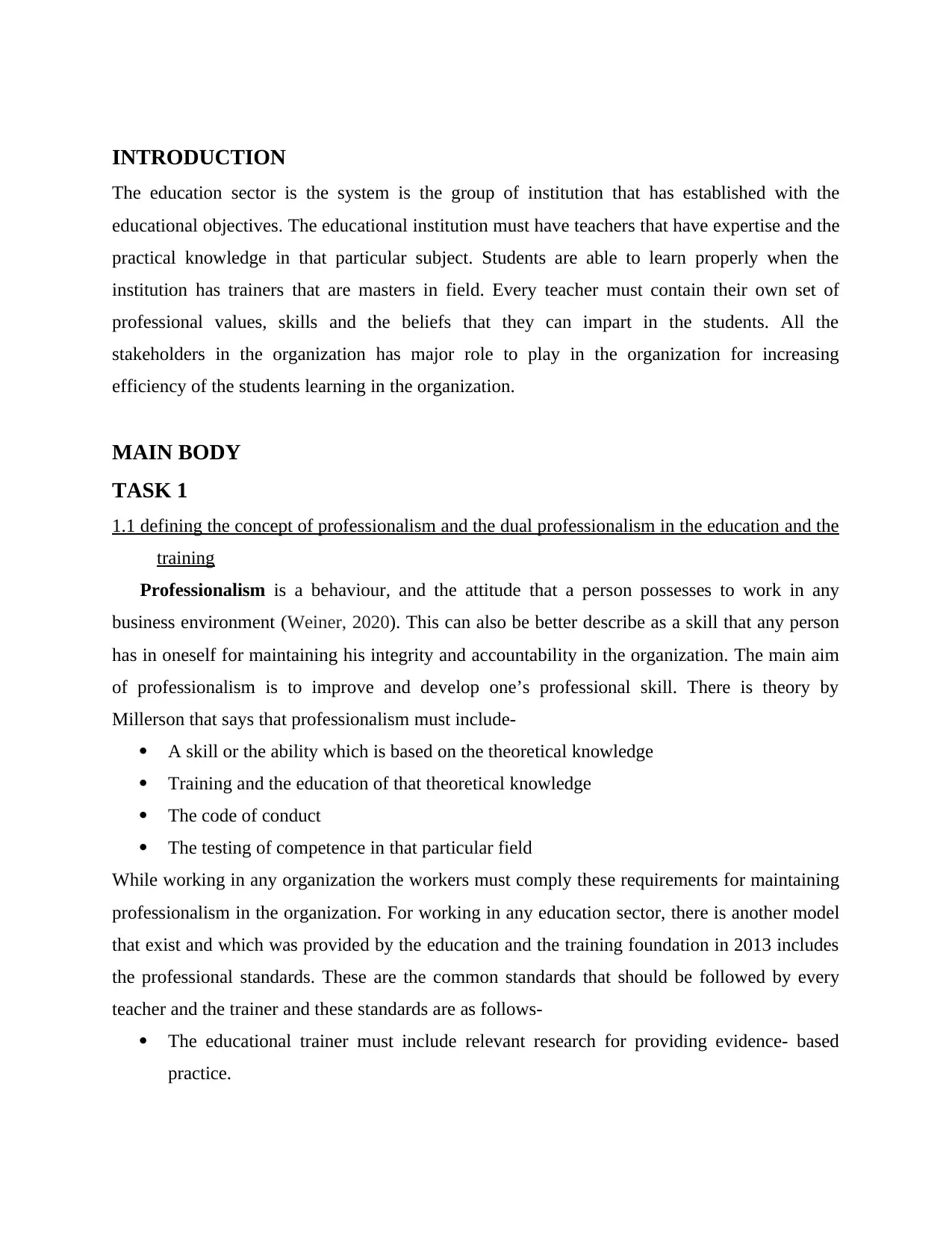
INTRODUCTION
The education sector is the system is the group of institution that has established with the
educational objectives. The educational institution must have teachers that have expertise and the
practical knowledge in that particular subject. Students are able to learn properly when the
institution has trainers that are masters in field. Every teacher must contain their own set of
professional values, skills and the beliefs that they can impart in the students. All the
stakeholders in the organization has major role to play in the organization for increasing
efficiency of the students learning in the organization.
MAIN BODY
TASK 1
1.1 defining the concept of professionalism and the dual professionalism in the education and the
training
Professionalism is a behaviour, and the attitude that a person possesses to work in any
business environment (Weiner, 2020). This can also be better describe as a skill that any person
has in oneself for maintaining his integrity and accountability in the organization. The main aim
of professionalism is to improve and develop one’s professional skill. There is theory by
Millerson that says that professionalism must include-
A skill or the ability which is based on the theoretical knowledge
Training and the education of that theoretical knowledge
The code of conduct
The testing of competence in that particular field
While working in any organization the workers must comply these requirements for maintaining
professionalism in the organization. For working in any education sector, there is another model
that exist and which was provided by the education and the training foundation in 2013 includes
the professional standards. These are the common standards that should be followed by every
teacher and the trainer and these standards are as follows-
The educational trainer must include relevant research for providing evidence- based
practice.
The education sector is the system is the group of institution that has established with the
educational objectives. The educational institution must have teachers that have expertise and the
practical knowledge in that particular subject. Students are able to learn properly when the
institution has trainers that are masters in field. Every teacher must contain their own set of
professional values, skills and the beliefs that they can impart in the students. All the
stakeholders in the organization has major role to play in the organization for increasing
efficiency of the students learning in the organization.
MAIN BODY
TASK 1
1.1 defining the concept of professionalism and the dual professionalism in the education and the
training
Professionalism is a behaviour, and the attitude that a person possesses to work in any
business environment (Weiner, 2020). This can also be better describe as a skill that any person
has in oneself for maintaining his integrity and accountability in the organization. The main aim
of professionalism is to improve and develop one’s professional skill. There is theory by
Millerson that says that professionalism must include-
A skill or the ability which is based on the theoretical knowledge
Training and the education of that theoretical knowledge
The code of conduct
The testing of competence in that particular field
While working in any organization the workers must comply these requirements for maintaining
professionalism in the organization. For working in any education sector, there is another model
that exist and which was provided by the education and the training foundation in 2013 includes
the professional standards. These are the common standards that should be followed by every
teacher and the trainer and these standards are as follows-
The educational trainer must include relevant research for providing evidence- based
practice.
Paraphrase This Document
Need a fresh take? Get an instant paraphrase of this document with our AI Paraphraser
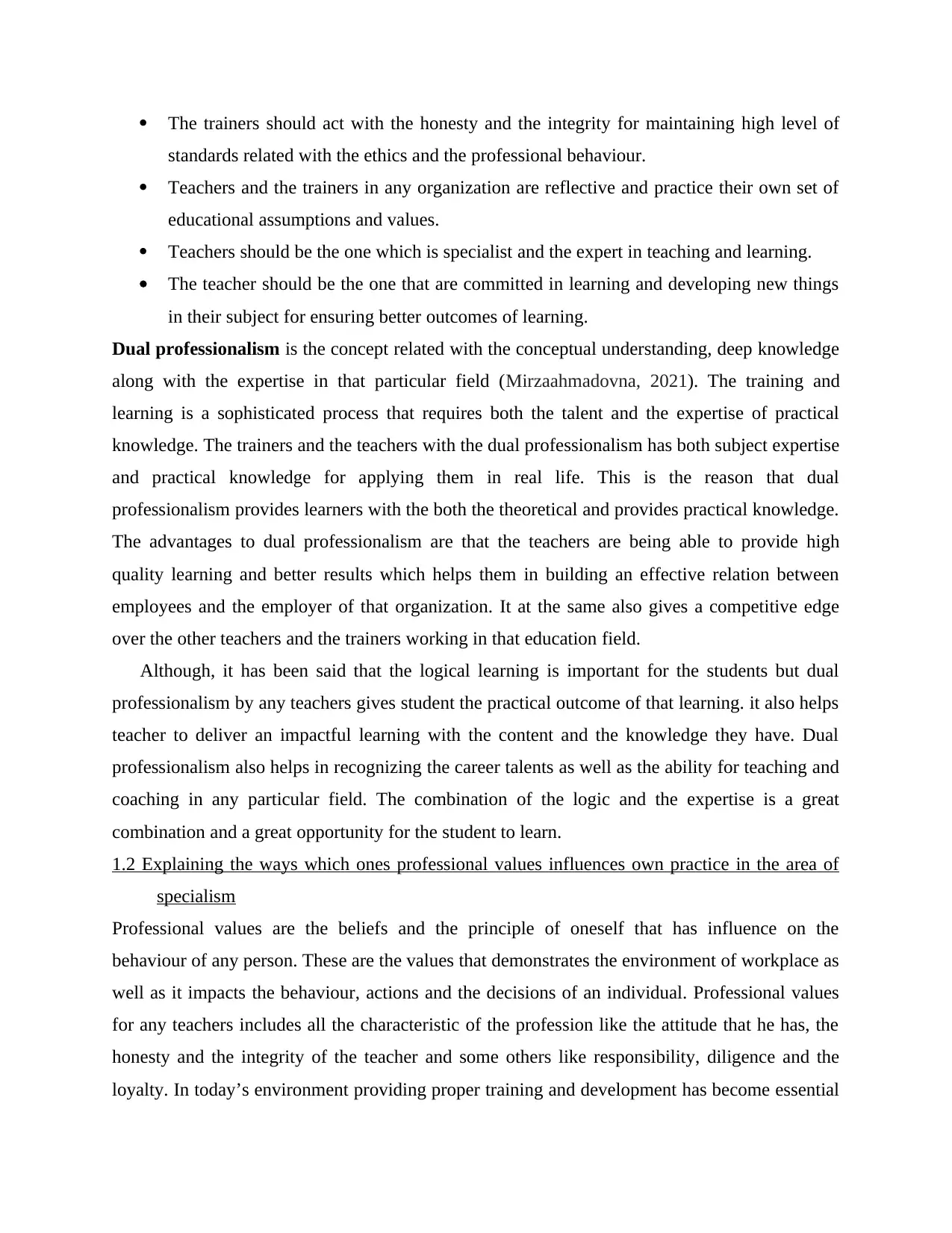
The trainers should act with the honesty and the integrity for maintaining high level of
standards related with the ethics and the professional behaviour.
Teachers and the trainers in any organization are reflective and practice their own set of
educational assumptions and values.
Teachers should be the one which is specialist and the expert in teaching and learning.
The teacher should be the one that are committed in learning and developing new things
in their subject for ensuring better outcomes of learning.
Dual professionalism is the concept related with the conceptual understanding, deep knowledge
along with the expertise in that particular field (Mirzaahmadovna, 2021). The training and
learning is a sophisticated process that requires both the talent and the expertise of practical
knowledge. The trainers and the teachers with the dual professionalism has both subject expertise
and practical knowledge for applying them in real life. This is the reason that dual
professionalism provides learners with the both the theoretical and provides practical knowledge.
The advantages to dual professionalism are that the teachers are being able to provide high
quality learning and better results which helps them in building an effective relation between
employees and the employer of that organization. It at the same also gives a competitive edge
over the other teachers and the trainers working in that education field.
Although, it has been said that the logical learning is important for the students but dual
professionalism by any teachers gives student the practical outcome of that learning. it also helps
teacher to deliver an impactful learning with the content and the knowledge they have. Dual
professionalism also helps in recognizing the career talents as well as the ability for teaching and
coaching in any particular field. The combination of the logic and the expertise is a great
combination and a great opportunity for the student to learn.
1.2 Explaining the ways which ones professional values influences own practice in the area of
specialism
Professional values are the beliefs and the principle of oneself that has influence on the
behaviour of any person. These are the values that demonstrates the environment of workplace as
well as it impacts the behaviour, actions and the decisions of an individual. Professional values
for any teachers includes all the characteristic of the profession like the attitude that he has, the
honesty and the integrity of the teacher and some others like responsibility, diligence and the
loyalty. In today’s environment providing proper training and development has become essential
standards related with the ethics and the professional behaviour.
Teachers and the trainers in any organization are reflective and practice their own set of
educational assumptions and values.
Teachers should be the one which is specialist and the expert in teaching and learning.
The teacher should be the one that are committed in learning and developing new things
in their subject for ensuring better outcomes of learning.
Dual professionalism is the concept related with the conceptual understanding, deep knowledge
along with the expertise in that particular field (Mirzaahmadovna, 2021). The training and
learning is a sophisticated process that requires both the talent and the expertise of practical
knowledge. The trainers and the teachers with the dual professionalism has both subject expertise
and practical knowledge for applying them in real life. This is the reason that dual
professionalism provides learners with the both the theoretical and provides practical knowledge.
The advantages to dual professionalism are that the teachers are being able to provide high
quality learning and better results which helps them in building an effective relation between
employees and the employer of that organization. It at the same also gives a competitive edge
over the other teachers and the trainers working in that education field.
Although, it has been said that the logical learning is important for the students but dual
professionalism by any teachers gives student the practical outcome of that learning. it also helps
teacher to deliver an impactful learning with the content and the knowledge they have. Dual
professionalism also helps in recognizing the career talents as well as the ability for teaching and
coaching in any particular field. The combination of the logic and the expertise is a great
combination and a great opportunity for the student to learn.
1.2 Explaining the ways which ones professional values influences own practice in the area of
specialism
Professional values are the beliefs and the principle of oneself that has influence on the
behaviour of any person. These are the values that demonstrates the environment of workplace as
well as it impacts the behaviour, actions and the decisions of an individual. Professional values
for any teachers includes all the characteristic of the profession like the attitude that he has, the
honesty and the integrity of the teacher and some others like responsibility, diligence and the
loyalty. In today’s environment providing proper training and development has become essential
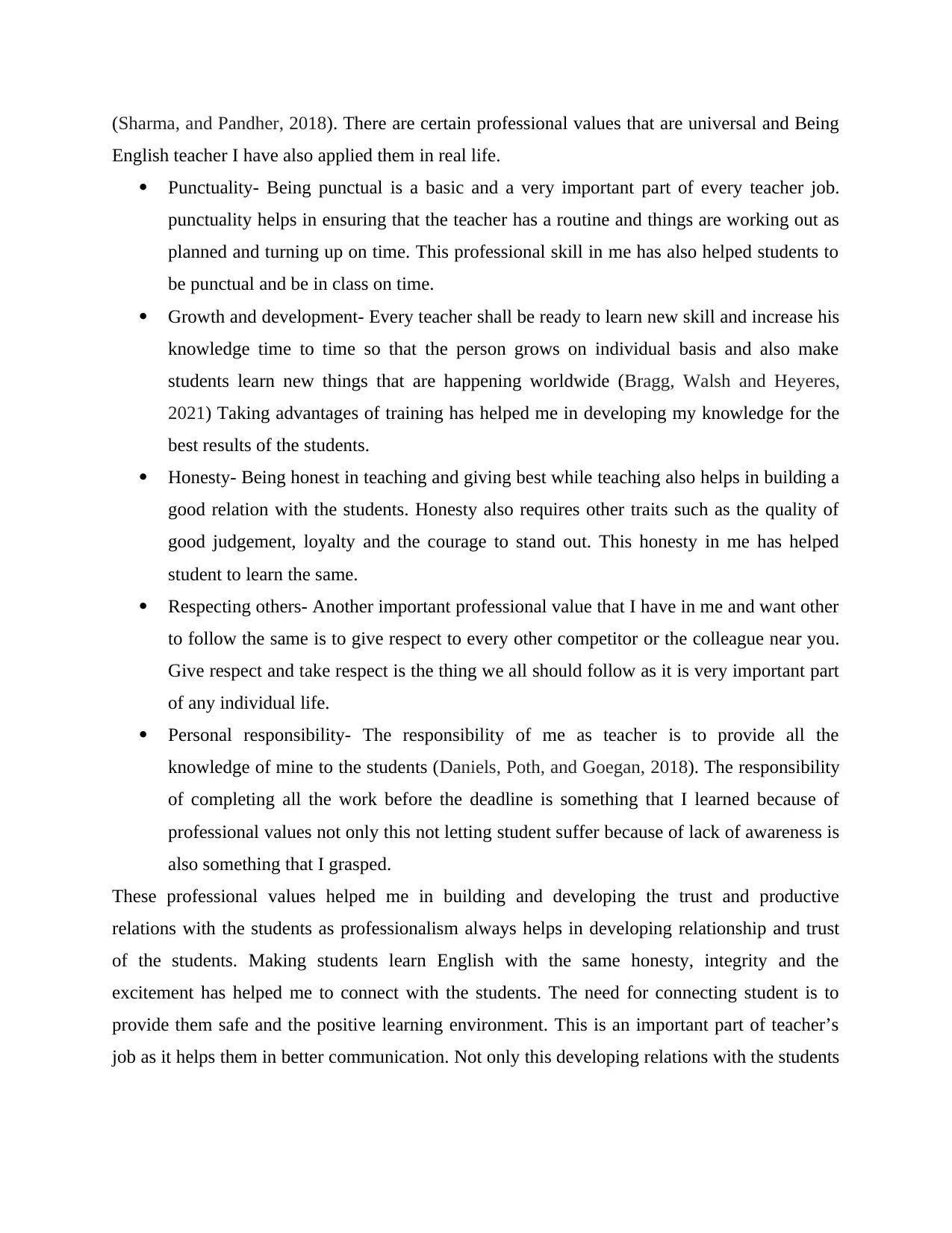
(Sharma, and Pandher, 2018). There are certain professional values that are universal and Being
English teacher I have also applied them in real life.
Punctuality- Being punctual is a basic and a very important part of every teacher job.
punctuality helps in ensuring that the teacher has a routine and things are working out as
planned and turning up on time. This professional skill in me has also helped students to
be punctual and be in class on time.
Growth and development- Every teacher shall be ready to learn new skill and increase his
knowledge time to time so that the person grows on individual basis and also make
students learn new things that are happening worldwide (Bragg, Walsh and Heyeres,
2021) Taking advantages of training has helped me in developing my knowledge for the
best results of the students.
Honesty- Being honest in teaching and giving best while teaching also helps in building a
good relation with the students. Honesty also requires other traits such as the quality of
good judgement, loyalty and the courage to stand out. This honesty in me has helped
student to learn the same.
Respecting others- Another important professional value that I have in me and want other
to follow the same is to give respect to every other competitor or the colleague near you.
Give respect and take respect is the thing we all should follow as it is very important part
of any individual life.
Personal responsibility- The responsibility of me as teacher is to provide all the
knowledge of mine to the students (Daniels, Poth, and Goegan, 2018). The responsibility
of completing all the work before the deadline is something that I learned because of
professional values not only this not letting student suffer because of lack of awareness is
also something that I grasped.
These professional values helped me in building and developing the trust and productive
relations with the students as professionalism always helps in developing relationship and trust
of the students. Making students learn English with the same honesty, integrity and the
excitement has helped me to connect with the students. The need for connecting student is to
provide them safe and the positive learning environment. This is an important part of teacher’s
job as it helps them in better communication. Not only this developing relations with the students
English teacher I have also applied them in real life.
Punctuality- Being punctual is a basic and a very important part of every teacher job.
punctuality helps in ensuring that the teacher has a routine and things are working out as
planned and turning up on time. This professional skill in me has also helped students to
be punctual and be in class on time.
Growth and development- Every teacher shall be ready to learn new skill and increase his
knowledge time to time so that the person grows on individual basis and also make
students learn new things that are happening worldwide (Bragg, Walsh and Heyeres,
2021) Taking advantages of training has helped me in developing my knowledge for the
best results of the students.
Honesty- Being honest in teaching and giving best while teaching also helps in building a
good relation with the students. Honesty also requires other traits such as the quality of
good judgement, loyalty and the courage to stand out. This honesty in me has helped
student to learn the same.
Respecting others- Another important professional value that I have in me and want other
to follow the same is to give respect to every other competitor or the colleague near you.
Give respect and take respect is the thing we all should follow as it is very important part
of any individual life.
Personal responsibility- The responsibility of me as teacher is to provide all the
knowledge of mine to the students (Daniels, Poth, and Goegan, 2018). The responsibility
of completing all the work before the deadline is something that I learned because of
professional values not only this not letting student suffer because of lack of awareness is
also something that I grasped.
These professional values helped me in building and developing the trust and productive
relations with the students as professionalism always helps in developing relationship and trust
of the students. Making students learn English with the same honesty, integrity and the
excitement has helped me to connect with the students. The need for connecting student is to
provide them safe and the positive learning environment. This is an important part of teacher’s
job as it helps them in better communication. Not only this developing relations with the students
⊘ This is a preview!⊘
Do you want full access?
Subscribe today to unlock all pages.

Trusted by 1+ million students worldwide
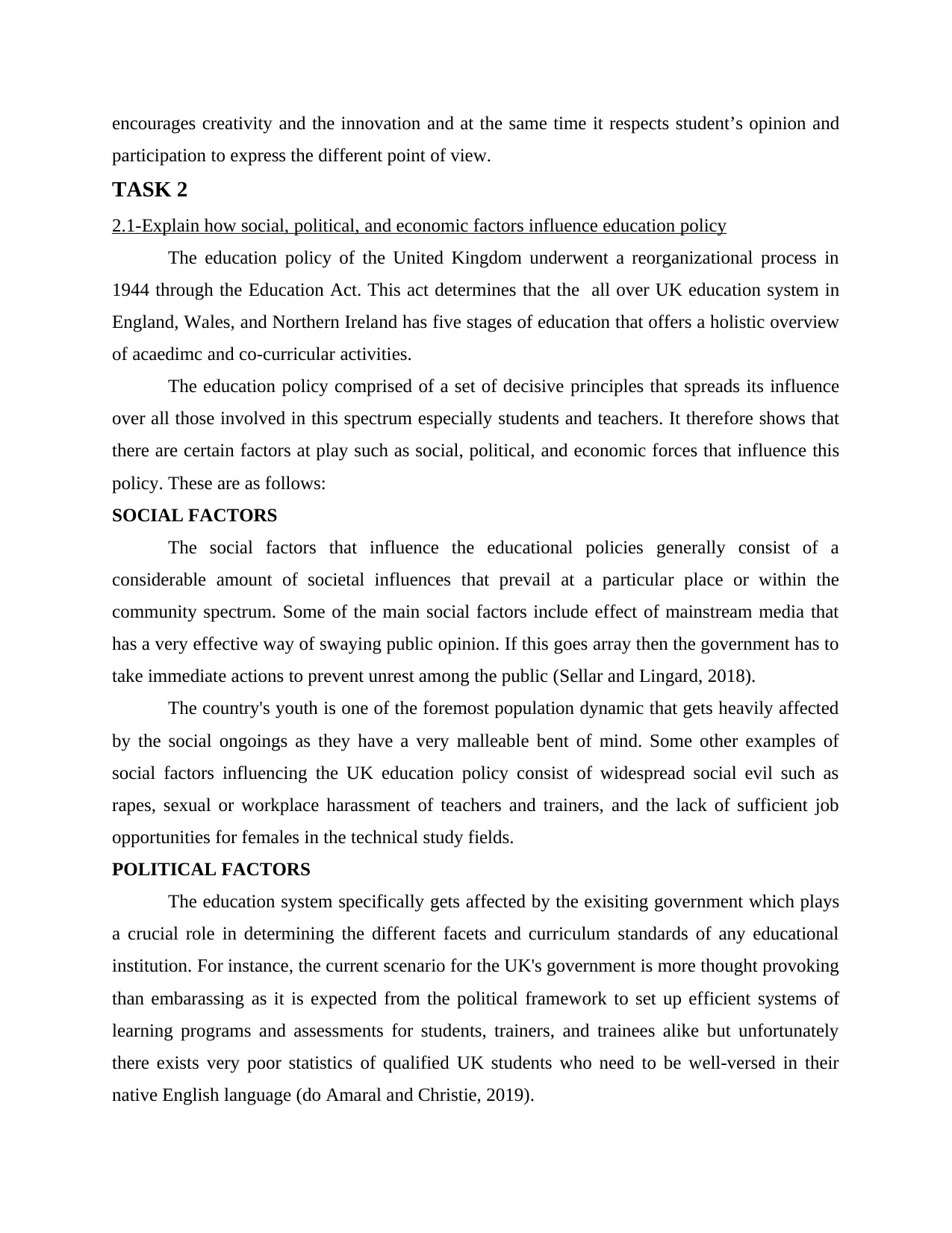
encourages creativity and the innovation and at the same time it respects student’s opinion and
participation to express the different point of view.
TASK 2
2.1-Explain how social, political, and economic factors influence education policy
The education policy of the United Kingdom underwent a reorganizational process in
1944 through the Education Act. This act determines that the all over UK education system in
England, Wales, and Northern Ireland has five stages of education that offers a holistic overview
of acaedimc and co-curricular activities.
The education policy comprised of a set of decisive principles that spreads its influence
over all those involved in this spectrum especially students and teachers. It therefore shows that
there are certain factors at play such as social, political, and economic forces that influence this
policy. These are as follows:
SOCIAL FACTORS
The social factors that influence the educational policies generally consist of a
considerable amount of societal influences that prevail at a particular place or within the
community spectrum. Some of the main social factors include effect of mainstream media that
has a very effective way of swaying public opinion. If this goes array then the government has to
take immediate actions to prevent unrest among the public (Sellar and Lingard, 2018).
The country's youth is one of the foremost population dynamic that gets heavily affected
by the social ongoings as they have a very malleable bent of mind. Some other examples of
social factors influencing the UK education policy consist of widespread social evil such as
rapes, sexual or workplace harassment of teachers and trainers, and the lack of sufficient job
opportunities for females in the technical study fields.
POLITICAL FACTORS
The education system specifically gets affected by the exisiting government which plays
a crucial role in determining the different facets and curriculum standards of any educational
institution. For instance, the current scenario for the UK's government is more thought provoking
than embarassing as it is expected from the political framework to set up efficient systems of
learning programs and assessments for students, trainers, and trainees alike but unfortunately
there exists very poor statistics of qualified UK students who need to be well-versed in their
native English language (do Amaral and Christie, 2019).
participation to express the different point of view.
TASK 2
2.1-Explain how social, political, and economic factors influence education policy
The education policy of the United Kingdom underwent a reorganizational process in
1944 through the Education Act. This act determines that the all over UK education system in
England, Wales, and Northern Ireland has five stages of education that offers a holistic overview
of acaedimc and co-curricular activities.
The education policy comprised of a set of decisive principles that spreads its influence
over all those involved in this spectrum especially students and teachers. It therefore shows that
there are certain factors at play such as social, political, and economic forces that influence this
policy. These are as follows:
SOCIAL FACTORS
The social factors that influence the educational policies generally consist of a
considerable amount of societal influences that prevail at a particular place or within the
community spectrum. Some of the main social factors include effect of mainstream media that
has a very effective way of swaying public opinion. If this goes array then the government has to
take immediate actions to prevent unrest among the public (Sellar and Lingard, 2018).
The country's youth is one of the foremost population dynamic that gets heavily affected
by the social ongoings as they have a very malleable bent of mind. Some other examples of
social factors influencing the UK education policy consist of widespread social evil such as
rapes, sexual or workplace harassment of teachers and trainers, and the lack of sufficient job
opportunities for females in the technical study fields.
POLITICAL FACTORS
The education system specifically gets affected by the exisiting government which plays
a crucial role in determining the different facets and curriculum standards of any educational
institution. For instance, the current scenario for the UK's government is more thought provoking
than embarassing as it is expected from the political framework to set up efficient systems of
learning programs and assessments for students, trainers, and trainees alike but unfortunately
there exists very poor statistics of qualified UK students who need to be well-versed in their
native English language (do Amaral and Christie, 2019).
Paraphrase This Document
Need a fresh take? Get an instant paraphrase of this document with our AI Paraphraser
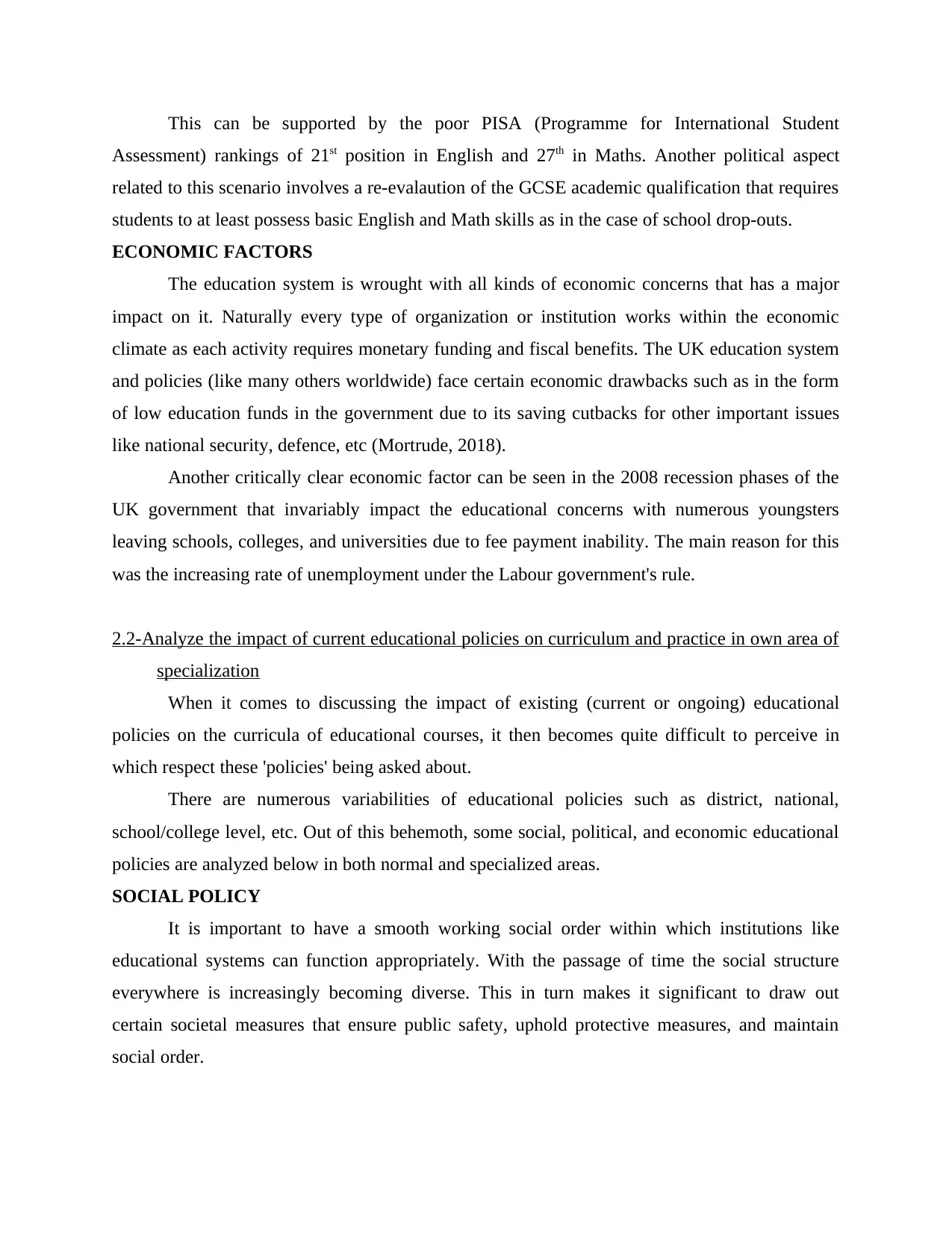
This can be supported by the poor PISA (Programme for International Student
Assessment) rankings of 21st position in English and 27th in Maths. Another political aspect
related to this scenario involves a re-evalaution of the GCSE academic qualification that requires
students to at least possess basic English and Math skills as in the case of school drop-outs.
ECONOMIC FACTORS
The education system is wrought with all kinds of economic concerns that has a major
impact on it. Naturally every type of organization or institution works within the economic
climate as each activity requires monetary funding and fiscal benefits. The UK education system
and policies (like many others worldwide) face certain economic drawbacks such as in the form
of low education funds in the government due to its saving cutbacks for other important issues
like national security, defence, etc (Mortrude, 2018).
Another critically clear economic factor can be seen in the 2008 recession phases of the
UK government that invariably impact the educational concerns with numerous youngsters
leaving schools, colleges, and universities due to fee payment inability. The main reason for this
was the increasing rate of unemployment under the Labour government's rule.
2.2-Analyze the impact of current educational policies on curriculum and practice in own area of
specialization
When it comes to discussing the impact of existing (current or ongoing) educational
policies on the curricula of educational courses, it then becomes quite difficult to perceive in
which respect these 'policies' being asked about.
There are numerous variabilities of educational policies such as district, national,
school/college level, etc. Out of this behemoth, some social, political, and economic educational
policies are analyzed below in both normal and specialized areas.
SOCIAL POLICY
It is important to have a smooth working social order within which institutions like
educational systems can function appropriately. With the passage of time the social structure
everywhere is increasingly becoming diverse. This in turn makes it significant to draw out
certain societal measures that ensure public safety, uphold protective measures, and maintain
social order.
Assessment) rankings of 21st position in English and 27th in Maths. Another political aspect
related to this scenario involves a re-evalaution of the GCSE academic qualification that requires
students to at least possess basic English and Math skills as in the case of school drop-outs.
ECONOMIC FACTORS
The education system is wrought with all kinds of economic concerns that has a major
impact on it. Naturally every type of organization or institution works within the economic
climate as each activity requires monetary funding and fiscal benefits. The UK education system
and policies (like many others worldwide) face certain economic drawbacks such as in the form
of low education funds in the government due to its saving cutbacks for other important issues
like national security, defence, etc (Mortrude, 2018).
Another critically clear economic factor can be seen in the 2008 recession phases of the
UK government that invariably impact the educational concerns with numerous youngsters
leaving schools, colleges, and universities due to fee payment inability. The main reason for this
was the increasing rate of unemployment under the Labour government's rule.
2.2-Analyze the impact of current educational policies on curriculum and practice in own area of
specialization
When it comes to discussing the impact of existing (current or ongoing) educational
policies on the curricula of educational courses, it then becomes quite difficult to perceive in
which respect these 'policies' being asked about.
There are numerous variabilities of educational policies such as district, national,
school/college level, etc. Out of this behemoth, some social, political, and economic educational
policies are analyzed below in both normal and specialized areas.
SOCIAL POLICY
It is important to have a smooth working social order within which institutions like
educational systems can function appropriately. With the passage of time the social structure
everywhere is increasingly becoming diverse. This in turn makes it significant to draw out
certain societal measures that ensure public safety, uphold protective measures, and maintain
social order.
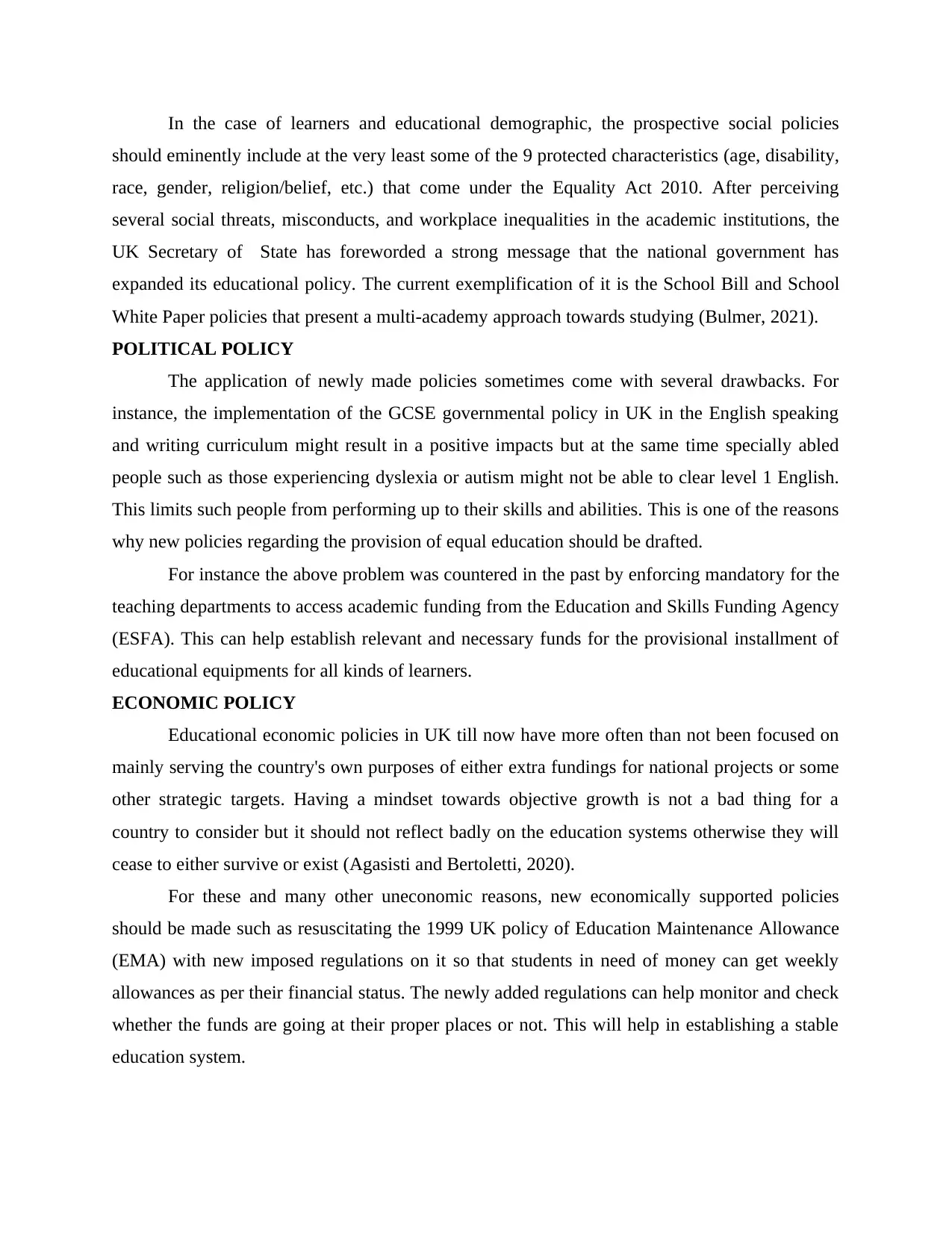
In the case of learners and educational demographic, the prospective social policies
should eminently include at the very least some of the 9 protected characteristics (age, disability,
race, gender, religion/belief, etc.) that come under the Equality Act 2010. After perceiving
several social threats, misconducts, and workplace inequalities in the academic institutions, the
UK Secretary of State has foreworded a strong message that the national government has
expanded its educational policy. The current exemplification of it is the School Bill and School
White Paper policies that present a multi-academy approach towards studying (Bulmer, 2021).
POLITICAL POLICY
The application of newly made policies sometimes come with several drawbacks. For
instance, the implementation of the GCSE governmental policy in UK in the English speaking
and writing curriculum might result in a positive impacts but at the same time specially abled
people such as those experiencing dyslexia or autism might not be able to clear level 1 English.
This limits such people from performing up to their skills and abilities. This is one of the reasons
why new policies regarding the provision of equal education should be drafted.
For instance the above problem was countered in the past by enforcing mandatory for the
teaching departments to access academic funding from the Education and Skills Funding Agency
(ESFA). This can help establish relevant and necessary funds for the provisional installment of
educational equipments for all kinds of learners.
ECONOMIC POLICY
Educational economic policies in UK till now have more often than not been focused on
mainly serving the country's own purposes of either extra fundings for national projects or some
other strategic targets. Having a mindset towards objective growth is not a bad thing for a
country to consider but it should not reflect badly on the education systems otherwise they will
cease to either survive or exist (Agasisti and Bertoletti, 2020).
For these and many other uneconomic reasons, new economically supported policies
should be made such as resuscitating the 1999 UK policy of Education Maintenance Allowance
(EMA) with new imposed regulations on it so that students in need of money can get weekly
allowances as per their financial status. The newly added regulations can help monitor and check
whether the funds are going at their proper places or not. This will help in establishing a stable
education system.
should eminently include at the very least some of the 9 protected characteristics (age, disability,
race, gender, religion/belief, etc.) that come under the Equality Act 2010. After perceiving
several social threats, misconducts, and workplace inequalities in the academic institutions, the
UK Secretary of State has foreworded a strong message that the national government has
expanded its educational policy. The current exemplification of it is the School Bill and School
White Paper policies that present a multi-academy approach towards studying (Bulmer, 2021).
POLITICAL POLICY
The application of newly made policies sometimes come with several drawbacks. For
instance, the implementation of the GCSE governmental policy in UK in the English speaking
and writing curriculum might result in a positive impacts but at the same time specially abled
people such as those experiencing dyslexia or autism might not be able to clear level 1 English.
This limits such people from performing up to their skills and abilities. This is one of the reasons
why new policies regarding the provision of equal education should be drafted.
For instance the above problem was countered in the past by enforcing mandatory for the
teaching departments to access academic funding from the Education and Skills Funding Agency
(ESFA). This can help establish relevant and necessary funds for the provisional installment of
educational equipments for all kinds of learners.
ECONOMIC POLICY
Educational economic policies in UK till now have more often than not been focused on
mainly serving the country's own purposes of either extra fundings for national projects or some
other strategic targets. Having a mindset towards objective growth is not a bad thing for a
country to consider but it should not reflect badly on the education systems otherwise they will
cease to either survive or exist (Agasisti and Bertoletti, 2020).
For these and many other uneconomic reasons, new economically supported policies
should be made such as resuscitating the 1999 UK policy of Education Maintenance Allowance
(EMA) with new imposed regulations on it so that students in need of money can get weekly
allowances as per their financial status. The newly added regulations can help monitor and check
whether the funds are going at their proper places or not. This will help in establishing a stable
education system.
⊘ This is a preview!⊘
Do you want full access?
Subscribe today to unlock all pages.

Trusted by 1+ million students worldwide
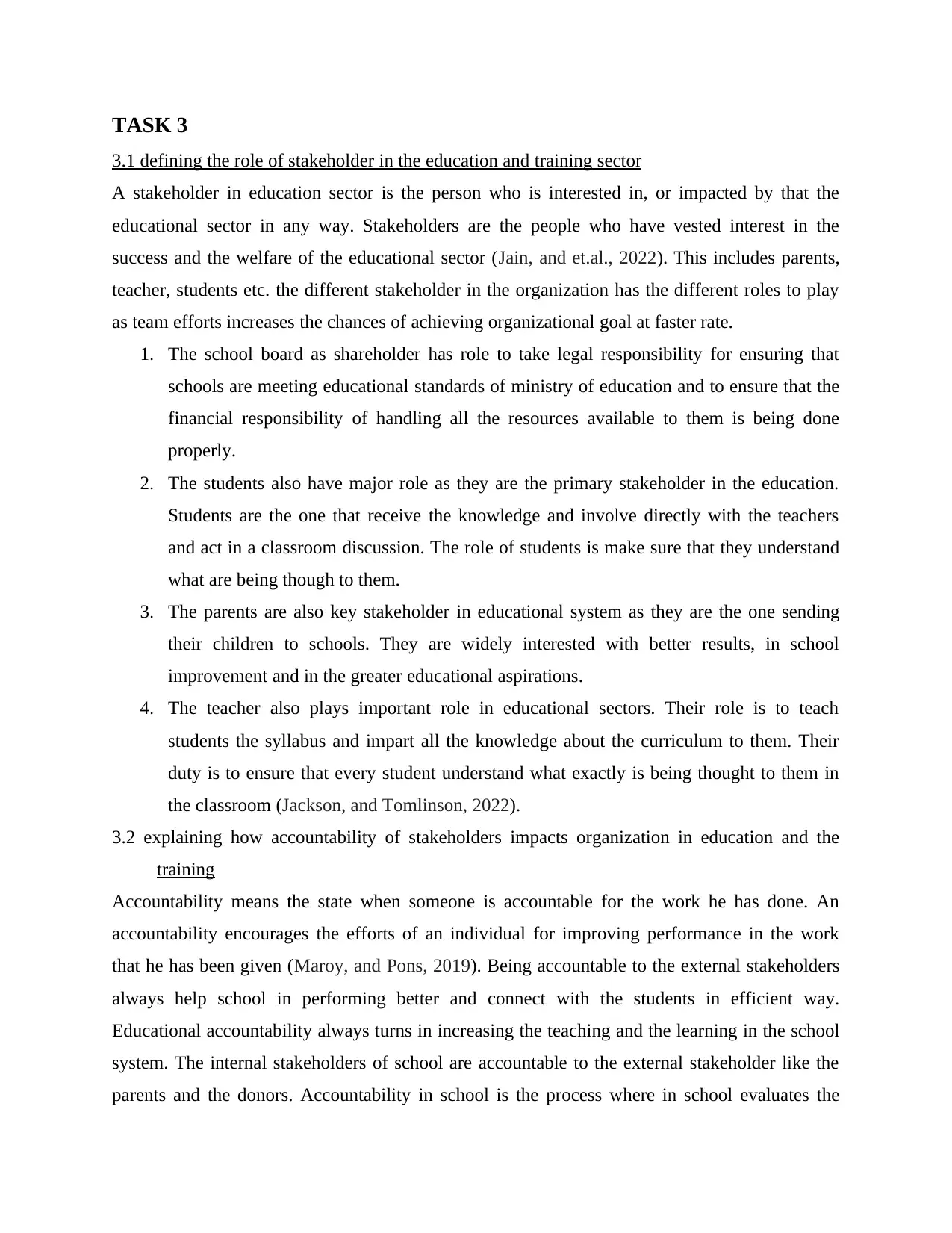
TASK 3
3.1 defining the role of stakeholder in the education and training sector
A stakeholder in education sector is the person who is interested in, or impacted by that the
educational sector in any way. Stakeholders are the people who have vested interest in the
success and the welfare of the educational sector (Jain, and et.al., 2022). This includes parents,
teacher, students etc. the different stakeholder in the organization has the different roles to play
as team efforts increases the chances of achieving organizational goal at faster rate.
1. The school board as shareholder has role to take legal responsibility for ensuring that
schools are meeting educational standards of ministry of education and to ensure that the
financial responsibility of handling all the resources available to them is being done
properly.
2. The students also have major role as they are the primary stakeholder in the education.
Students are the one that receive the knowledge and involve directly with the teachers
and act in a classroom discussion. The role of students is make sure that they understand
what are being though to them.
3. The parents are also key stakeholder in educational system as they are the one sending
their children to schools. They are widely interested with better results, in school
improvement and in the greater educational aspirations.
4. The teacher also plays important role in educational sectors. Their role is to teach
students the syllabus and impart all the knowledge about the curriculum to them. Their
duty is to ensure that every student understand what exactly is being thought to them in
the classroom (Jackson, and Tomlinson, 2022).
3.2 explaining how accountability of stakeholders impacts organization in education and the
training
Accountability means the state when someone is accountable for the work he has done. An
accountability encourages the efforts of an individual for improving performance in the work
that he has been given (Maroy, and Pons, 2019). Being accountable to the external stakeholders
always help school in performing better and connect with the students in efficient way.
Educational accountability always turns in increasing the teaching and the learning in the school
system. The internal stakeholders of school are accountable to the external stakeholder like the
parents and the donors. Accountability in school is the process where in school evaluates the
3.1 defining the role of stakeholder in the education and training sector
A stakeholder in education sector is the person who is interested in, or impacted by that the
educational sector in any way. Stakeholders are the people who have vested interest in the
success and the welfare of the educational sector (Jain, and et.al., 2022). This includes parents,
teacher, students etc. the different stakeholder in the organization has the different roles to play
as team efforts increases the chances of achieving organizational goal at faster rate.
1. The school board as shareholder has role to take legal responsibility for ensuring that
schools are meeting educational standards of ministry of education and to ensure that the
financial responsibility of handling all the resources available to them is being done
properly.
2. The students also have major role as they are the primary stakeholder in the education.
Students are the one that receive the knowledge and involve directly with the teachers
and act in a classroom discussion. The role of students is make sure that they understand
what are being though to them.
3. The parents are also key stakeholder in educational system as they are the one sending
their children to schools. They are widely interested with better results, in school
improvement and in the greater educational aspirations.
4. The teacher also plays important role in educational sectors. Their role is to teach
students the syllabus and impart all the knowledge about the curriculum to them. Their
duty is to ensure that every student understand what exactly is being thought to them in
the classroom (Jackson, and Tomlinson, 2022).
3.2 explaining how accountability of stakeholders impacts organization in education and the
training
Accountability means the state when someone is accountable for the work he has done. An
accountability encourages the efforts of an individual for improving performance in the work
that he has been given (Maroy, and Pons, 2019). Being accountable to the external stakeholders
always help school in performing better and connect with the students in efficient way.
Educational accountability always turns in increasing the teaching and the learning in the school
system. The internal stakeholders of school are accountable to the external stakeholder like the
parents and the donors. Accountability in school is the process where in school evaluates the
Paraphrase This Document
Need a fresh take? Get an instant paraphrase of this document with our AI Paraphraser
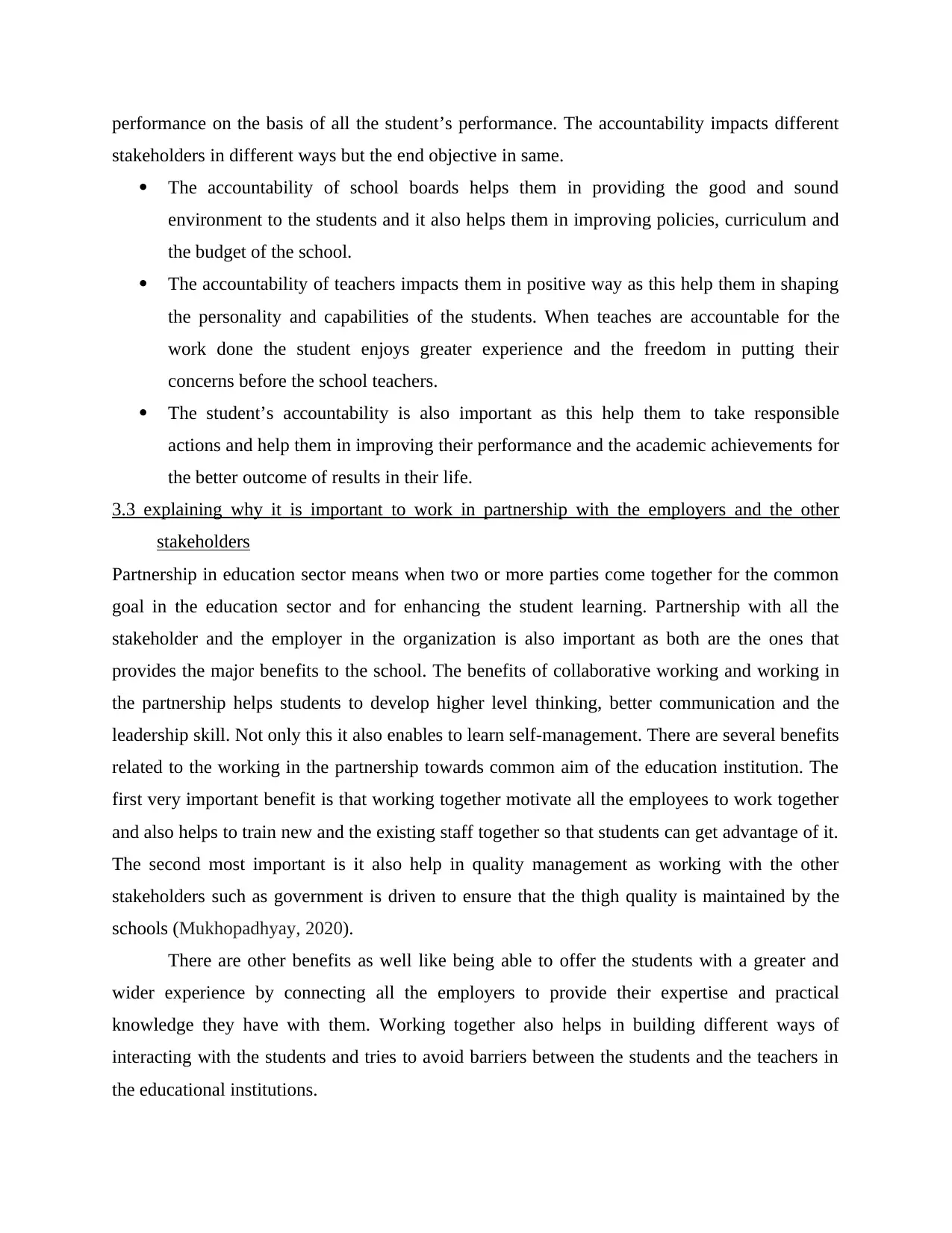
performance on the basis of all the student’s performance. The accountability impacts different
stakeholders in different ways but the end objective in same.
The accountability of school boards helps them in providing the good and sound
environment to the students and it also helps them in improving policies, curriculum and
the budget of the school.
The accountability of teachers impacts them in positive way as this help them in shaping
the personality and capabilities of the students. When teaches are accountable for the
work done the student enjoys greater experience and the freedom in putting their
concerns before the school teachers.
The student’s accountability is also important as this help them to take responsible
actions and help them in improving their performance and the academic achievements for
the better outcome of results in their life.
3.3 explaining why it is important to work in partnership with the employers and the other
stakeholders
Partnership in education sector means when two or more parties come together for the common
goal in the education sector and for enhancing the student learning. Partnership with all the
stakeholder and the employer in the organization is also important as both are the ones that
provides the major benefits to the school. The benefits of collaborative working and working in
the partnership helps students to develop higher level thinking, better communication and the
leadership skill. Not only this it also enables to learn self-management. There are several benefits
related to the working in the partnership towards common aim of the education institution. The
first very important benefit is that working together motivate all the employees to work together
and also helps to train new and the existing staff together so that students can get advantage of it.
The second most important is it also help in quality management as working with the other
stakeholders such as government is driven to ensure that the thigh quality is maintained by the
schools (Mukhopadhyay, 2020).
There are other benefits as well like being able to offer the students with a greater and
wider experience by connecting all the employers to provide their expertise and practical
knowledge they have with them. Working together also helps in building different ways of
interacting with the students and tries to avoid barriers between the students and the teachers in
the educational institutions.
stakeholders in different ways but the end objective in same.
The accountability of school boards helps them in providing the good and sound
environment to the students and it also helps them in improving policies, curriculum and
the budget of the school.
The accountability of teachers impacts them in positive way as this help them in shaping
the personality and capabilities of the students. When teaches are accountable for the
work done the student enjoys greater experience and the freedom in putting their
concerns before the school teachers.
The student’s accountability is also important as this help them to take responsible
actions and help them in improving their performance and the academic achievements for
the better outcome of results in their life.
3.3 explaining why it is important to work in partnership with the employers and the other
stakeholders
Partnership in education sector means when two or more parties come together for the common
goal in the education sector and for enhancing the student learning. Partnership with all the
stakeholder and the employer in the organization is also important as both are the ones that
provides the major benefits to the school. The benefits of collaborative working and working in
the partnership helps students to develop higher level thinking, better communication and the
leadership skill. Not only this it also enables to learn self-management. There are several benefits
related to the working in the partnership towards common aim of the education institution. The
first very important benefit is that working together motivate all the employees to work together
and also helps to train new and the existing staff together so that students can get advantage of it.
The second most important is it also help in quality management as working with the other
stakeholders such as government is driven to ensure that the thigh quality is maintained by the
schools (Mukhopadhyay, 2020).
There are other benefits as well like being able to offer the students with a greater and
wider experience by connecting all the employers to provide their expertise and practical
knowledge they have with them. Working together also helps in building different ways of
interacting with the students and tries to avoid barriers between the students and the teachers in
the educational institutions.
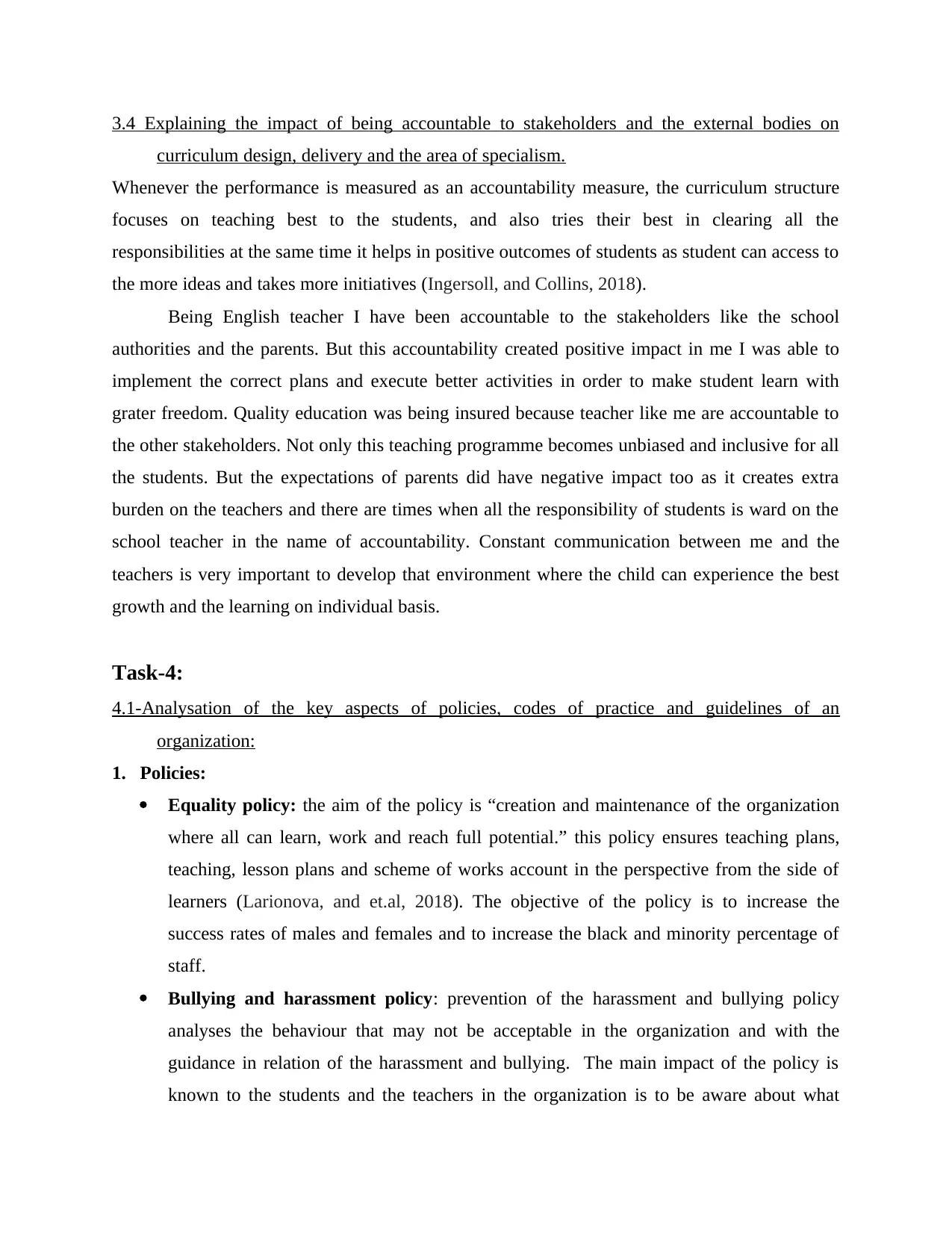
3.4 Explaining the impact of being accountable to stakeholders and the external bodies on
curriculum design, delivery and the area of specialism.
Whenever the performance is measured as an accountability measure, the curriculum structure
focuses on teaching best to the students, and also tries their best in clearing all the
responsibilities at the same time it helps in positive outcomes of students as student can access to
the more ideas and takes more initiatives (Ingersoll, and Collins, 2018).
Being English teacher I have been accountable to the stakeholders like the school
authorities and the parents. But this accountability created positive impact in me I was able to
implement the correct plans and execute better activities in order to make student learn with
grater freedom. Quality education was being insured because teacher like me are accountable to
the other stakeholders. Not only this teaching programme becomes unbiased and inclusive for all
the students. But the expectations of parents did have negative impact too as it creates extra
burden on the teachers and there are times when all the responsibility of students is ward on the
school teacher in the name of accountability. Constant communication between me and the
teachers is very important to develop that environment where the child can experience the best
growth and the learning on individual basis.
Task-4:
4.1-Analysation of the key aspects of policies, codes of practice and guidelines of an
organization:
1. Policies:
Equality policy: the aim of the policy is “creation and maintenance of the organization
where all can learn, work and reach full potential.” this policy ensures teaching plans,
teaching, lesson plans and scheme of works account in the perspective from the side of
learners (Larionova, and et.al, 2018). The objective of the policy is to increase the
success rates of males and females and to increase the black and minority percentage of
staff.
Bullying and harassment policy: prevention of the harassment and bullying policy
analyses the behaviour that may not be acceptable in the organization and with the
guidance in relation of the harassment and bullying. The main impact of the policy is
known to the students and the teachers in the organization is to be aware about what
curriculum design, delivery and the area of specialism.
Whenever the performance is measured as an accountability measure, the curriculum structure
focuses on teaching best to the students, and also tries their best in clearing all the
responsibilities at the same time it helps in positive outcomes of students as student can access to
the more ideas and takes more initiatives (Ingersoll, and Collins, 2018).
Being English teacher I have been accountable to the stakeholders like the school
authorities and the parents. But this accountability created positive impact in me I was able to
implement the correct plans and execute better activities in order to make student learn with
grater freedom. Quality education was being insured because teacher like me are accountable to
the other stakeholders. Not only this teaching programme becomes unbiased and inclusive for all
the students. But the expectations of parents did have negative impact too as it creates extra
burden on the teachers and there are times when all the responsibility of students is ward on the
school teacher in the name of accountability. Constant communication between me and the
teachers is very important to develop that environment where the child can experience the best
growth and the learning on individual basis.
Task-4:
4.1-Analysation of the key aspects of policies, codes of practice and guidelines of an
organization:
1. Policies:
Equality policy: the aim of the policy is “creation and maintenance of the organization
where all can learn, work and reach full potential.” this policy ensures teaching plans,
teaching, lesson plans and scheme of works account in the perspective from the side of
learners (Larionova, and et.al, 2018). The objective of the policy is to increase the
success rates of males and females and to increase the black and minority percentage of
staff.
Bullying and harassment policy: prevention of the harassment and bullying policy
analyses the behaviour that may not be acceptable in the organization and with the
guidance in relation of the harassment and bullying. The main impact of the policy is
known to the students and the teachers in the organization is to be aware about what
⊘ This is a preview!⊘
Do you want full access?
Subscribe today to unlock all pages.

Trusted by 1+ million students worldwide
1 out of 19
Related Documents
Your All-in-One AI-Powered Toolkit for Academic Success.
+13062052269
info@desklib.com
Available 24*7 on WhatsApp / Email
![[object Object]](/_next/static/media/star-bottom.7253800d.svg)
Unlock your academic potential
Copyright © 2020–2025 A2Z Services. All Rights Reserved. Developed and managed by ZUCOL.

